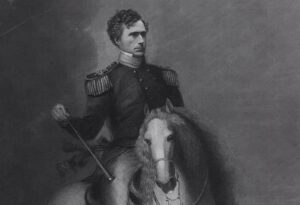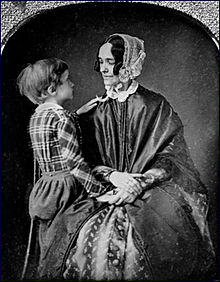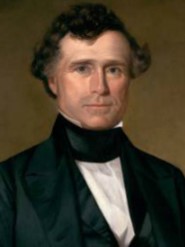» posted on Friday, June 28th, 2024 by Linda Lou Burton
#14. Pierce, Franklin
Linda Lou Burton posting from Little Rock, Arkansas –Franklin Pierce (November 23, 1804 – October 8, 1869) was the 14th president of the United States, from 1853 to 1857. Franklin was handsome; just look at all his portraits and see for yourself. History books record him as a drunk; he died of cirrhosis of the liver. Historians rank him as one of the worst and least memorable of all presidents. And as for his wife, well, her story is grim. How deep do we need to go to find something positive to say about Franklin besides the fact that he was good-looking? Go way, way back. Franklin was “born in a log cabin in New Hampshire“ and that happened in November, so the world he entered was COLD. His older brothers and his father were military men – Revolutionary War and War of 1812 uniforms and swords and guns all over the house. And his mother kept having babies that needed tending to. Franklin was a middle kid. And we know what middle kids do, don’t we? They usually resort to tomfoolery to get a little attention. Maybe that explains some of the choices he made in later life. Would I invite this man to my party? I’m on the fence about that. I wouldn’t want a drunk at my party, but geez, after the tragedy that happened to his family between election day and inauguration day, I would have taken a covered dish AND a bottle of whiskey over to his house. But I’m getting ahead of the story. What about that tomfoolery?
Benjamin Pierce made sure his sons were educated. When Franklin was twelve, he was sent to the town school some miles away. Franklin didn’t like school, so one Sunday afternoon he just walked back home. His father fed him, put him in the carriage, and drove him part way back before kicking him out. In a thunderstorm! By the time Franklin entered Phillips Exeter Academy to prepare for college, his school reputation was well established. He was charming, but “prone to misbehavior.”
And Then What Happened
College days brought some interesting friends; one was Nathaniel Hawthorne, who became a lifelong friend. Franklin was “last in his class” after two years; when he graduated in 1824 he’d moved up to fifth in a class of fourteen. Franklin had joined the Athenian Literary Society as a freshman; he organized an unofficial militia company during his junior year, the Bowdoin Cadets. Some tomfoolery there, like leading a strike against the school’s president over an argument about where they could drill. He went on to study law, and was admitted to the New Hampshire bar in 1827 and began to practice; he lost his first case. He did well as a lawyer however, because – he was charming. He had a deep voice. He had a good memory for names and faces. And he got elected to a few things.
Government Positions
- Served in New Hampshire Legislature, 1829-33
- Member of US House of Representatives, 1833-37
- United States Senate, 1837-42
- 14th President of the United States, 1853-1857
 But we can’t forget the military influence he grew up with. He wanted to fight in a war. He wanted to wear a uniform, like his brothers, and his father. He was a passionate advocate for volunteer militias and had experience mustering and drilling bodies of troops. When Congress declared war against Mexico in May 1846, he immediately volunteered. Before you could say Battle of Contreras, Franklin found himself at the port of Vera Cruz as a Brigadier General preparing a march of 2,500 men to take supplies to General Winfield Scott. Charm is only good for so much during a battle. Desire to be viewed as doing something great can push you on however. First day of battle, Franklin’s horse tripped and fell into a crevice, pinning him underneath and injuring his knee. Because it appeared he had fainted, one of his men called for a replacement, calling him a “damned coward.” Next day Franklin was back, hobbling behind his men with a lame knee. As the Battle of Churubusco approached, General Scott ordered Franklin to convalesce. Franklin begged to be allowed to “lead my brigade,” so entered the fight tied to his saddle, and passed out on the field. The Americans won and Franklin wound up getting to negotiate the armistice. The Battle of Mexico City again found Franklin ill; diarrhea kept him in the sick tent. Nevertheless, he remained in command during the three-month occupation of the city and came home to a hero’s welcome. He resigned from the Army in December 1847 as a popular guy. But Jane wasn’t happy.
But we can’t forget the military influence he grew up with. He wanted to fight in a war. He wanted to wear a uniform, like his brothers, and his father. He was a passionate advocate for volunteer militias and had experience mustering and drilling bodies of troops. When Congress declared war against Mexico in May 1846, he immediately volunteered. Before you could say Battle of Contreras, Franklin found himself at the port of Vera Cruz as a Brigadier General preparing a march of 2,500 men to take supplies to General Winfield Scott. Charm is only good for so much during a battle. Desire to be viewed as doing something great can push you on however. First day of battle, Franklin’s horse tripped and fell into a crevice, pinning him underneath and injuring his knee. Because it appeared he had fainted, one of his men called for a replacement, calling him a “damned coward.” Next day Franklin was back, hobbling behind his men with a lame knee. As the Battle of Churubusco approached, General Scott ordered Franklin to convalesce. Franklin begged to be allowed to “lead my brigade,” so entered the fight tied to his saddle, and passed out on the field. The Americans won and Franklin wound up getting to negotiate the armistice. The Battle of Mexico City again found Franklin ill; diarrhea kept him in the sick tent. Nevertheless, he remained in command during the three-month occupation of the city and came home to a hero’s welcome. He resigned from the Army in December 1847 as a popular guy. But Jane wasn’t happy.
Jane
Jane Means Appleton (1806-1863) was petite, frail, and shy, the third of six children born to Elizabeth and the Reverend Jesse Appleton. After her father died, Jane was sent to live with her wealthy grandparents in Amherst, New Hampshire. She was prone to deep depression; and it isn’t known how she met Franklin. What is known is that they married November 19, 1834 – he was 30, she was 28 – and that her grandparents opposed the union due to Franklin’s political ambitions. Jane didn’t like the political life either; she hated living in Washington. She blamed politics for all the troubles in her life.
Franklin and Jane had three sons. Their first, Franklin Jr, died three days after his birth in 1836, while Franklin was a member of the US House of Representatives. Their second, Franklin Robert, was born in 1839 and their third son Benjamin in 1841, when Franklin was a US Senator. Jane was so unhappy in Washington she encouraged Franklin to resign his Senate seat and return to New Hampshire, which he did in 1842. Little Franklin Robert died the next year in New Hampshire at age four, from epidemic typhus.
Was it patriotism, or a need to just shoot something – anything – that sent Franklin off to fight in the Mexican-American War in 1846? Back home as a hero in 1847, his political callings were stirred again. Next thing you know, Franklin Pierce was on the ticket for the 1852 election, opposing General Winfield Scott. Jane fainted when she heard the news.
Bring Out The Tissues
 Little Benjamin, Benny as he was called and 11 years old at the time, knew exactly how his mother felt about Washington DC. He wrote a letter to her after Franklin’s nomination saying, “I hope he won’t be elected for I should not like to be at Washington and I know you would not either.”
Little Benjamin, Benny as he was called and 11 years old at the time, knew exactly how his mother felt about Washington DC. He wrote a letter to her after Franklin’s nomination saying, “I hope he won’t be elected for I should not like to be at Washington and I know you would not either.”
Jane prayed Franklin would lose the election, but he pushed the idea that being a president’s son would be an asset to Benny in the future. When the Pierce/King ticket tallied up 254 electoral votes to Scott’s 42, Jane reluctantly made plans to move.
In January 1853 the Pierce family took a train trip to Boston to attend a family friend’s funeral. During their return, a coupler failed and threw several cars down a snowy embankment. Little Benny’s head was crushed and partly severed right before his parent’s eyes. He was the only fatality in the accident.
Franklin and Jane suffered severe depression afterward. When Franklin departed New Hampshire for his inauguration, Jane remained behind. Franklin affirmed his oath of office on a law book rather than a Bible that March 4, and delivered his inaugural address from memory. Regarding his personal tragedy, he said to the crowd, “You have summoned me in my weakness, you must sustain me by your strength.”
Jane wondered if the train accident was divine punishment for her husband’s pursuit and acceptance of high office. She wrote a lengthy letter of apology to Benny for her failings as a mother. She avoided social functions for her first two years as First Lady, making her public debut in that role to great sympathy at the annual public reception held at the White House on New Year’s Day, 1855.
Franklin was not nominated for a second term and left office on March 4, 1857.
After Washington
Seeking warmer weather, the Pierces spent the next three years traveling, beginning with a stay in Madeira and followed by tours of Europe and the Bahamas. Jane died of tuberculosis in December 1863; she was buried at Old North Cemetery in Concord, New Hampshire. Franklin was further grieved by the death of his close friend Nathaniel Hawthorne in May 1864; he was with Hawthorne when the author died unexpectedly. Hawthorne had controversially dedicated his final book to Franklin. Some Democrats tried again to put Franklin’s name up for consideration as the 1864 presidential election unfolded, but he kept his distance; Lincoln easily won a second term.
Though Franklin’s drinking impaired his health, he grew increasingly spiritual. He used his influence to improve the treatment of Jefferson Davis, by then a prisoner at Fort Monroe in Virginia. He offered financial help to Hawthorne’s son Julian, as well as to his own nephews. On the second anniversary of Jane’s death, he was baptized into her Episcopal faith at St. Paul’s Church in Concord. He took up the life of a farmer, farming the land himself and drinking less. In mid-1869, suffering from severe cirrhosis of the liver, he hired a caretaker. No family members were present when he died October 28, at the age of 64.
Maybe he was forgettable as a president. I suspect it was a time he didn’t want to remember either.

